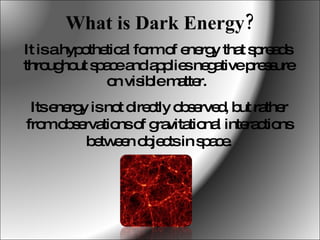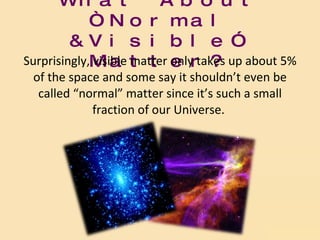Dark Matter And Energy P P
- 1. Dark Matter and Energy By: Taylor Kaine
- 2. What is Dark Matter? Dark matter is a hypothesized form of matter particle that does not emit electromagnetic radiation. The existence of dark matter is inferred from gravitational effects on visible matter, such as stars and galaxies.
- 3. What is Dark Energy? It is a hypothetical form of energy that spreads throughout space and applies negative pressure on visible matter. Its energy is not directly observed, but rather from observations of gravitational interactions between objects in space.
- 4. Facts, Facts & More Facts Dark Energy Takes up roughly 75% of the Universe It is causing the universe to expand Dark Matter Takes up 20% of the Universe They have the potential to be made out of WIMPS – Weakly Interacting Massive Particles Holds clusters of galaxies together The mass is five or six times greater than ordinary light They detect dark matter using the X-rays or gamma-rays that come from the decay of particles
- 5. What About “Normal &Visible” Matter? Surprisingly, visible matter only takes up about 5% of the space and some say it shouldn’t even be called “normal” matter since it’s such a small fraction of our Universe.
- 6. Are Dark Energy and Matter the Same Thing? Some scientists believe that dark energy and matter are so closely intertwined that it’s not possible for them to be two separate materials. Because these concepts are still hypothesized, nobody can be quite sure. Despite that, there are some similarities: They are both dark , meaning that it is not in the form of stars and planets that the human eye can see. They dominate almost 95% of the Universe’s mass and energy.
- 7. Works Cited "Is Dark Matter & Dark Energy the Same Thing?." The Daily Galaxy: Great Discoveries Channel : Science News, Tech News, Astronomy and Space Exploration . N.p., n.d. Web. 28 Jan. 2010. <http://www.dailygalaxy.com/my_weblog/2009/02/could-dark-matt.html>. Jones, Andrew Zimmerman. "Dark Energy - definition of dark energy." Physics . N.p., n.d. Web. 28 Jan. 2010. <http://physics.about.com/od/glossary Jones, Andrew Zimmerman. "Dark Matter - definition of dark matter." Physics . N.p., n.d. Web. 28 Jan. 2010. <http://physics.about.com/od/glossary percent., about 10. "Dark matter." UC Berkeley Astronomy Department Home . N.p., n.d. Web. 28 Jan. 2010. <http://astro.berkeley.edu/~mwhite the, studying. "Dark Matter - Introduction." Imagine The Universe! Home Page . N.p., n.d. Web. 28 Jan. 2010. <http://imagine.gsfc.nasa.gov/docs they, we know how long ago. "Dark Energy - Introduction." Imagine The Universe! Home Page . N.p., n.d. Web. 28 Jan. 2010. <http://imagine.gsfc.nasa.gov/docs/






